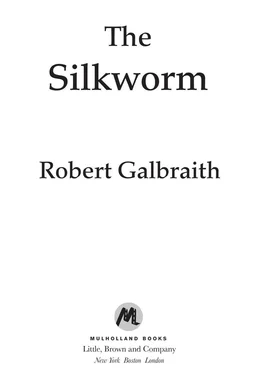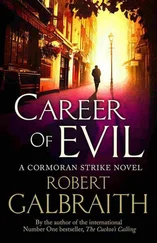Robert Galbraith - The Silkworm
Здесь есть возможность читать онлайн «Robert Galbraith - The Silkworm» весь текст электронной книги совершенно бесплатно (целиком полную версию без сокращений). В некоторых случаях можно слушать аудио, скачать через торрент в формате fb2 и присутствует краткое содержание. Год выпуска: 2014, ISBN: 2014, Издательство: Mulholland Books, Жанр: Старинная литература, на английском языке. Описание произведения, (предисловие) а так же отзывы посетителей доступны на портале библиотеки ЛибКат.
- Название:The Silkworm
- Автор:
- Издательство:Mulholland Books
- Жанр:
- Год:2014
- ISBN:9780316206877
- Рейтинг книги:3 / 5. Голосов: 2
-
Избранное:Добавить в избранное
- Отзывы:
-
Ваша оценка:
- 60
- 1
- 2
- 3
- 4
- 5
The Silkworm: краткое содержание, описание и аннотация
Предлагаем к чтению аннотацию, описание, краткое содержание или предисловие (зависит от того, что написал сам автор книги «The Silkworm»). Если вы не нашли необходимую информацию о книге — напишите в комментариях, мы постараемся отыскать её.
The Silkworm — читать онлайн бесплатно полную книгу (весь текст) целиком
Ниже представлен текст книги, разбитый по страницам. Система сохранения места последней прочитанной страницы, позволяет с удобством читать онлайн бесплатно книгу «The Silkworm», без необходимости каждый раз заново искать на чём Вы остановились. Поставьте закладку, и сможете в любой момент перейти на страницу, на которой закончили чтение.
Интервал:
Закладка:
Of course, it was possible that once Matthew and Robin were actually married, Matthew might use his improved status to persuade his new wife to leave the job that he clearly disliked her doing (Strike had correctly interpreted Robin’s hesitations and evasions on that score). However, Strike was sure that Robin would have told him, had the wedding date been fixed, so he considered that danger, at present, remote.
With yet another huge yawn, he folded the newspaper and threw it onto the chair, turning his attention to the television news. His one personal extravagance since moving into the tiny attic flat had been satellite TV. His small portable set now sat on top of a Sky box and the picture, no longer reliant on a feeble indoor aerial, was sharp instead of grainy. Kenneth Clarke, the Justice Secretary, was announcing plans to slash £350 million from the legal aid budget. Strike watched through his haze of tiredness as the florid, paunchy man told Parliament that he wished to “discourage people from resorting to lawyers whenever they face a problem, and instead encourage them to consider more suitable methods of dispute resolution.”
He meant, of course, that poor people ought to relinquish the services of the law. The likes of Strike’s average client would still avail themselves of expensive barristers. Most of his work these days was undertaken on behalf of the mistrustful, endlessly betrayed rich. His was the information that fed their sleek lawyers, that enabled them to win better settlements in their vitriolic divorces and their acrimonious business disputes. A steady stream of well-heeled clients was passing his name on to similar men and women, with tediously similar difficulties; this was the reward for distinction in his particular line of work, and if it was often repetitive, it was also lucrative.
When the news ended he clambered laboriously off the bed, removed the remnants of his meal from the chair beside him and walked stiffly into his small kitchen area to wash everything up. He never neglected such things: habits of self-respect learned in the army had not left him in the depths of his poverty, nor were they entirely due to military training. He had been a tidy boy, imitating his Uncle Ted, whose liking for order everywhere from his toolbox to his boathouse had contrasted so starkly with the chaos that had surrounded Strike’s mother, Leda.
Within ten minutes, after a last pee in the toilet that was always sodden because of its proximity to the shower, and cleaning his teeth at the kitchen sink where there was more room, Strike was back on his bed, removing his prosthesis.
The weather forecast for the next day was rounding off the news: subzero temperatures and fog. Strike rubbed powder into the end of his amputated leg; it was less sore tonight than it had been a few months ago. Today’s full English breakfast and takeaway curry notwithstanding, he had lost a bit of weight since he had been able to cook for himself again, and this had eased the pressure on his leg.
He pointed the remote control at the TV screen; a laughing blonde and her washing powder vanished into blankness. Strike maneuvered himself clumsily beneath the covers.
Of course, if Owen Quine was hiding at his writer’s retreat it would be easy enough to winkle him out. Egotistical bastard, he sounded, flouncing off into the darkness with his precious book…
The hazy mental image of a furious man storming away with a holdall over his shoulder dissolved almost as quickly as it had formed. Strike was sliding into a welcome, deep and dreamless sleep. The faint pulse of a bass guitar far below in the subterranean bar was swiftly drowned by his own rasping snores.
6
Oh, Mr. Tattle, every thing is safe with you, we know.
William Congreve, Love for Love
Wads of icy mist were still clinging to the buildings of Exmouth Market when Strike turned into it at ten to nine the following morning. It did not feel like a London street, not with pavement seating outside its many cafés, pastel-painted façades and a basilica-like church, gold, blue and brick: Church of Our Most Holy Redeemer, wreathed in smoky vapor. Chilly fog, shops full of curios, curbside tables and chairs; if he could have added the tang of saltwater and the mournful screech of seagulls he might have thought himself back in Cornwall, where he had spent the most stable parts of his childhood.
A small sign on a nondescript door beside a bakery announced the offices of Crossfire Publishing. Strike buzzed the bell promptly at nine o’clock and was admitted to a steep whitewashed staircase, up which he clambered with some difficulty and with liberal use of the handrail.
He was met on the top landing by a slight, dandyish and bespectacled man of around thirty. He had wavy, shoulder-length hair and wore jeans, a waistcoat and a paisley shirt with a touch of frill around the cuffs.
“Hi there,” he said. “I’m Christian Fisher. Cameron, isn’t it?”
“Cormoran,” Strike corrected him automatically, “but—”
He had been about to say that he answered to Cameron, a stock response to years of the mistake, but Christian Fisher came back at once:
“Cormoran—Cornish giant.”
“That’s right,” said Strike, surprised.
“We published a kids’ book on English folklore last year,” said Fisher, pushing open white double doors and leading Strike into a cluttered, open-plan space with walls plastered in posters and many untidy bookshelves. A scruffy young woman with dark hair looked up curiously at Strike as he walked past.
“Coffee? Tea?” offered Fisher, leading Strike into his own office, a small room off the main area with a pleasant view over the sleepy, foggy street. “I can get Jade to nip out for us.” Strike declined, saying truthfully that he had just had coffee, but wondering, too, why Fisher seemed to be settling in for a longer meeting than Strike felt the circumstances justified. “Just a latte, then, Jade,” Fisher called through the door.
“Have a seat,” Fisher said to Strike, and he began to flit around the bookshelves that lined the walls. “Didn’t he live in St. Michael’s Mount, the giant Cormoran?”
“Yeah,” said Strike. “And Jack’s supposed to have killed him. Of beanstalk fame.”
“It’s here somewhere,” said Fisher, still searching the shelves. “ Folk Tales of the British Isles . Have you got kids?”
“No,” said Strike.
“Oh,” said Fisher. “Well, I won’t bother, then.”
And with a grin he took the chair opposite Strike.
“So, am I allowed to ask who’s hired you? Am I allowed to guess?”
“Feel free,” said Strike, who on principle never forbade speculation.
“It’s either Daniel Chard or Michael Fancourt,” said Fisher. “Am I right?”
The lenses on his glasses gave his eyes a concentrated, beady look. Though giving no outward sign, Strike was taken aback. Michael Fancourt was a very famous writer who had recently won a major literary prize. Why exactly would he be interested in the missing Quine?
“Afraid not,” said Strike. “It’s Quine’s wife, Leonora.”
Fisher looked almost comically astonished.
“His wife?” he repeated blankly. “That mousy woman who looks like Rose West? What’s she hired a private detective for?”
“Her husband’s disappeared. He’s been gone eleven days.”
“Quine’s disappeared? But—but then…”
Strike could tell Fisher had been anticipating a very different conversation, one to which he had been eagerly looking forward.
“But why’s she sent you to me?”
“She thinks you know where Quine is.”
“How the hell would I know?” asked Fisher, and he appeared genuinely bewildered. “He’s not a friend of mine.”
Читать дальшеИнтервал:
Закладка:
Похожие книги на «The Silkworm»
Представляем Вашему вниманию похожие книги на «The Silkworm» списком для выбора. Мы отобрали схожую по названию и смыслу литературу в надежде предоставить читателям больше вариантов отыскать новые, интересные, ещё непрочитанные произведения.
Обсуждение, отзывы о книге «The Silkworm» и просто собственные мнения читателей. Оставьте ваши комментарии, напишите, что Вы думаете о произведении, его смысле или главных героях. Укажите что конкретно понравилось, а что нет, и почему Вы так считаете.












